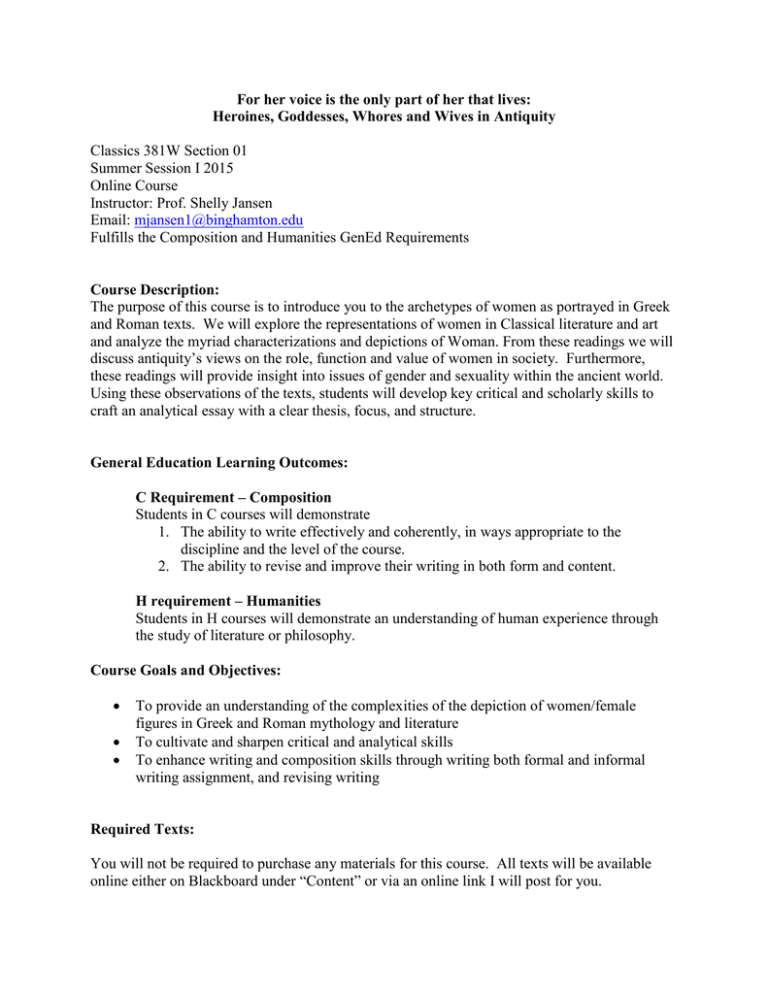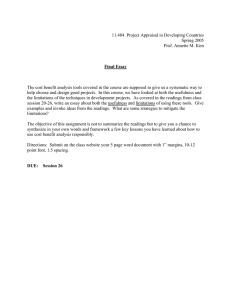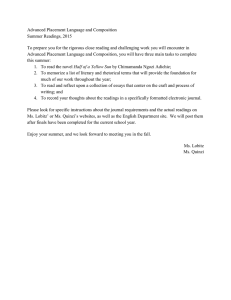HEROINES/GODDESSES/WHORES/WIVES IN GRECO-ROMAN ANTIQUITY (CLAS 381W)
advertisement

For her voice is the only part of her that lives: Heroines, Goddesses, Whores and Wives in Antiquity Classics 381W Section 01 Summer Session I 2015 Online Course Instructor: Prof. Shelly Jansen Email: mjansen1@binghamton.edu Fulfills the Composition and Humanities GenEd Requirements Course Description: The purpose of this course is to introduce you to the archetypes of women as portrayed in Greek and Roman texts. We will explore the representations of women in Classical literature and art and analyze the myriad characterizations and depictions of Woman. From these readings we will discuss antiquity’s views on the role, function and value of women in society. Furthermore, these readings will provide insight into issues of gender and sexuality within the ancient world. Using these observations of the texts, students will develop key critical and scholarly skills to craft an analytical essay with a clear thesis, focus, and structure. General Education Learning Outcomes: C Requirement – Composition Students in C courses will demonstrate 1. The ability to write effectively and coherently, in ways appropriate to the discipline and the level of the course. 2. The ability to revise and improve their writing in both form and content. H requirement – Humanities Students in H courses will demonstrate an understanding of human experience through the study of literature or philosophy. Course Goals and Objectives: To provide an understanding of the complexities of the depiction of women/female figures in Greek and Roman mythology and literature To cultivate and sharpen critical and analytical skills To enhance writing and composition skills through writing both formal and informal writing assignment, and revising writing Required Texts: You will not be required to purchase any materials for this course. All texts will be available online either on Blackboard under “Content” or via an online link I will post for you. Course Requirements: Discussion Board Entries As this is a composition-intensive course, a primary aim is to develop skills in written expression as well as in critical analysis. In the context of this online course, writing is the chief means by which you will engage one another in a discussion of the texts. To use the “Discussion Board,” click on the “Discussion” link on Blackboard and follow the thread(s) for the week in question. In order to receive credit, your entries will need to exhibit the following features: (1) they must respond either to the discussion threads I have posted or to comments made by a fellow student; (2) they must enhance the discussion either through original contribution the questions at hand or through the formulation of new questions that move the discussion forward; (3) they must demonstrate that you have read both the assigned texts and the discussion board entries written by your fellow students, referring to or quoting them directly; (4) they must be respectful toward your fellow students, especially when expressing disagreement; and (5) you must write one initial discussion board thread of approximately 200 words due on Thursdays (see daily breakdown schedule below) and then respond to at least two other students’ posts. These additional posts/comments must be at least 100 words in length and are due on Fridays each week. You are welcome, of course, to write additional entries as well, but they will not factor into your grade except as a positive indication of your level of overall engagement/contribution. These requirements for discussion board postings aim to help propel your overall engagement with the texts, encourage your overall participation in the course, and help fulfill the necessary composition (C) requirement. Reading Journals A reading journal is a series of individual entries, totaling two full double-spaced pages (not one and a smidge on the second page), written in response to the reading assignment in question. Each entry should be a response to a specific passage in the text – for example, to a particular aspect of the critical readings or specific aspect of a myth/text. In other words, a reading journal should not be merely a series of story/plot summaries. Entries can be about nearly anything in relation to your response to the texts: observations about tone, form, structure, imagery, philosophical or psychological issues, as long as they stay close to the text of the literary work in question and are not merely a summary of the text. Entries can range in length from a couple of sentences to a whole paragraph – though longer entries tend to be more productive – and need not relate to one another. Be sure that your journal covers a substantial portion of the reading assignment – not, for example, only the first or second half of the assignment, or only one myth if three or four are assigned for that week. Journals should be written after having read the texts thoroughly (and repeatedly if necessary) so that your response is based on a solid understanding of the material at hand. Although journals may be informal, they must, nevertheless, be written in complete sentences, not in shorthand or bullet points. You should write multiple entries in your journal per week. You do not have to write every day, but the journal should be a way for you to document your progress through the texts and the course. Critical Essays This course fulfills the Composition requirement and thus will be a writing intensive class. In order to meet the Composition gen-ed requirement, students must write at least 20 pages of original work and revise some of that writing over the course. In addition to the weekly journals you will also write two critical essays, each 5 full pages in length (Times New Roman, 12-point, double-spaced). The prompts for the essays will be posted on Blackboard at least one week before they are due. The essays should be well-organized around a central thesis and free of any grammatical, spelling and usage errors. Your essay should also contain proper citations for all quotes and references (you can use any citation style you like (e.g. MLA, APA, Chicago, etc.) as long as you are consistent. The specific requirements for the paper will be described in greater detail in the prompt. Remember that this is an essay and not a journal. This essay should therefore have a clear thesis, an argument around which you focus your essay. Your essay should not be a general response to the reading assignments like your journals might, but rather a polished argument that analyzes the texts in support of your main thesis. You do not have to go out and find additional outside research – but if you do quote from the text you are examining, I would expect that you would cite that source. You will be given the opportunity to rewrite your essays after I have initially graded them. Your final grade for each essay will be the average of the original essay’s grade and the rewrite’s grade. Given the brevity of the course I have made both of your rewritten essays due on the last day of class to ensure that you have enough time to review my comments and incorporate these ideas into your rewrite. Concerning Late Assignments: I accept all late work for partial credit. Keep in mind, however, that due to the brevity and quick pace of the course, it is imperative that students stay on schedule. Late assignments will be marked a ½ grade lower for each day they are late. For example, a would-be B+ paper handed in a day late will receive a B. For those of you taking this course while in another city or country other than Binghamton, NY, please note that all due dates are in Eastern Standard Time and plan accordingly. Grading: A AB+ B BC+ C CD F 93-100 90-92 87-89 83-86 80-82 77-79 73-76 70-72 60-69 59 or less Discussion Board Postings (total) – 100 points Journal 1 (2 pages) – 30 points Journal 2 (2 pages) – 30 points Journal 3 (2 pages) – 30 points Journal 4 (2 pages) – 30 points Journal 5 (2 pages) – 30 points Essay 1 and Rewrite (5 pages) – 125 points Essay 2 and Rewrite (5 pages) – 125 points Total = 500 points Communications and Technology: Announcements Please check the Announcements section of Blackboard every day. I will very frequently add announcements about assignments, grading, changes in schedule, etc. throughout the course. Typically I also send out the most important of these announcements via email as well, but it is important that you take the responsibility to keep up with the announcements on your own. Email Correspondence Please reserve email correspondence for questions that pertain to you individually. In other words, please do not email with questions whose answers can be found in the syllabus. If you are unsure about the nature of a given assignment, due date, etc., be sure to consult the syllabus first. The purpose of this policy is to make sure that my inbox is not flooded with superfluous emails, a circumstance that might prevent me from responding to serious and pertinent inquiries in a timely manner. If you have any questions that the syllabus cannot answer, please feel free to email me using my email address (mjansen1@binghamton.edu). Please do not use the Inbox or Communication features of Blackboard as I do not regularly check that site and do not want to miss or be delayed in responding to any of your questions. Assignments and Readings The syllabus, weekly readings, and prompts for your essays will be posted on Blackboard under “Content.” Turning in Assignments All assignments will be submitted using Turnitin. To turn in an assignment, go to “Content” on Blackboard and click on the link for the assignment in question. You will be prompted to upload your essay and click Submit. You should receive a receipt email once this is complete. If you do not receive an email receipt, you have not successfully turned in your assignment. Please be sure to keep these receipts in case of technical difficulties in order to prove that you have turned in your assignment on time. COURSE SCHEDULE Below I’ve provided a day-by-day break out detailing how I think you should schedule your time over the week so that way things do not pile up. This is simply a guide of how you might schedule your time. Hard deadlines are in bold below. WEEK 1: Eureka! Creation Myths and Women *Please note that this week is different as we start on a Tuesday due to the holiday.* Readings: Excerpts from Hesiod’s Works and Days and Theogony; story of Pygmalion from Ovid’s Metamorphoses; Book One of Ovid’s Metamorphoses 5/25: Happy Memorial Day! 5/26: Course Begins - Readings 5/27: (Re)readings; Read lecture 5/28: Post your initial Discussion Board thread by today; (Re)readings 5/29: Continue Discussion Board DB comments AND Journal 1 Due by 11:59PM EST Over the weekend: work on Essay 1 and/or start Week 2 readings WEEK 2: Purity and Sacrifice: The Virgin Martyr Archetype Readings: Iphigenia in Aulis by Euripides; Chapter on Athena from Classical Mythology; Antigone by Sophocles 6/1: Readings 6/2: (Re)Readings 6/3: Read lecture; Discussion Board; (Re)readings Essay 1 Due 6/4: (Re)readings; Post your initial Discussion Board thread by today 6/5: Continue Discussion Board DB comments AND Journal 2 due by 11:59PM EST Over the weekend: begin Week 3 readings WEEK 3: Illicit Desire, Temptation, and the Whore/Witch Archetype Readings: Excerpts from Odyssey re: Circe and the Syrens; Hippolytus by Euripides; stories of Myrrha, and Byblis from Ovid’s Metamorphoses 6/8: Readings 6/9: (Re)Readings 6/10: Read lecture; Discussion Board; (Re)readings 6/11: (Re)readings; Post your initial Discussion Board thread by today 6/12: Continue Discussion Board DB comments AND Journal 3 due by 11:59PM EST Over the weekend: work on Essay 2 WEEK 4: The Only Bee in the Bonnet: The Ideal Wife Readings: Semonides’s Poem 7 (on the types of women); Excerpt from the Odyssey Book 23 about Penelope; Alcestis by Euripides 6/15: Readings Essay 2 Due 6/16: (Re)Readings 6/17: Read lecture; Discussion Board; (Re)readings 6/18: (Re)readings; Post your initial Discussion Board thread by today 6/19: Continue Discussion Board DB comments AND Journal 4 due by 11:59PM EST Over the weekend: Begin Week 5 readings and/or work on revising Essays 1 & 2 WEEK 5: Crossing Gender Boundaries: Warriors, Androgens, and Avengers Readings: Medea by Euripides; story of Salamacis and Hermaphroditus in Ovid’s Metamorphoses; excerpt on Penthesilea, the Amazonian Queen, from Quintus Smyrnaeus 6/22: Readings 6/23: Readings 6/24: Read lecture; Discussion Board; (Re)eadings 6/25: (Re)reading; Post your initial Discussion Board thread by today 6/26: Continue Discussion Board DB comments AND Journal 5 AND Essay 1 & 2 Rewrites due by 11:59PM EST Note: You may turn in your Essay 1 & 2 Rewrites at any time during the course, but it must be in by 11:59PM EST on the last day of class 6/26. *Note: This course fulfills the “C” (composition) and “H” (humanities) GE requirement. ** Note: Plagiarism, in any form, will not be tolerated in this or any course at Binghamton University. If you are caught plagiarizing, you will automatically fail that assignment. If you have any questions regarding plagiarism or academic honesty, please consult me or the University’s Student Handbook for more information. ***Note: I reserve the right to alter the syllabus or schedule at any time.




